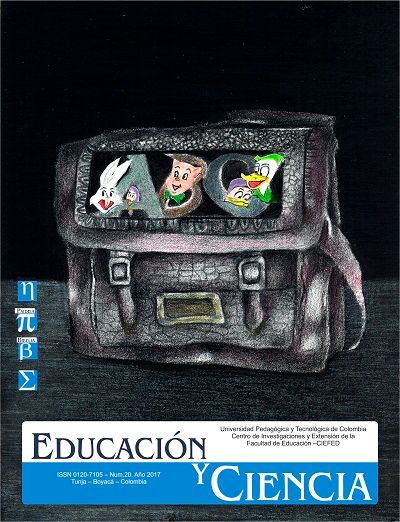(Re) significación de la práctica docente: reflexiones acerca del quehacer del maestro

Resumen
El presente artículo busca reflexionar sobre la práctica docente de los profesores (autores) de matemáticas y ciencias naturales y educación ambiental de la Institución Educativa Juan José Rondón de Soatá para que afronten cuestionamientos y de manera crítica, permanente, constante autoevalúen su quehacer, con el objetivo de (re)significar estas prácticas docentes, al materializar estrategias hibridas para propiciar en el aula otras interacciones, otros sentidos en ellas. La investigación se desarrolla en cuatro fases que interactúan, teniendo en cuenta la espiral de Carr y Kemmis, planificación, acción, observación y reflexión, se desarrolla a partir del paradigma sociocrítico, cuenta con una unidad de análisis de 28 estudiantes de grado 802.
Palabras clave
Práctica docente, (re)significación, educación, cultura, sociedad, enseñanza, aprendizaje.
Citas
Bustamante, Á. (2006). Educación, compromiso social y formación docente.
Revista Iberoamericana de Educación, (37). Recuperado de http://www.rieoei.org/
opinion16.htm
Carr, W., & Kemmis, S. (1988). Teoría crítica de la enseñanza: la investigación acción en la
formación del profesorado. Barcelona: Ediciones Martínez Roca S.A.
Carbonell, J. (2015). Pedagogías del siglo XXI. Alternativas para la innovación Educativa.
Barcelona: Editorial octaedro.
De Bono, E., (2000). El pensamiento lateral. Buenos aires: Editorial Paidós
Devanand, S. (2002). Junto al Maestro. INC. New York: 2022.Fierro, C.,
Fortoul, B., & Rosas, L. (1999). Transformando la Práctica Docente. Una propuesta
basada en la investigación-acción. México: Editorial Paidós.
Gómez, L., Bustamante, A., & Castiblanco, I. (2015). Estilos pedagógicos
de docentes de la Facultad de Educación de la Uptc en los proyectos
pedagógicos e investigativos I y II. Praxis & Saber, 6(12), 209-240. doi:https://
doi.org/10.19053/22160159.3770
Gonzaga, W. (2002). La observación un medio para mejorar la práctica docente.
Revista Educare, Universidad de Costa Rica. 115-126.
Encarnación, M. Liderazgo pedagógico. (2012). Guatemala. Recuperado de
https://issuu.com/marlen374/docs/issuu_liderazgo_pedagogico
Jiménez Espinosa, A., Díaz Moreno, M., & Leguizamón Romero, J. (2011).
Propuesta de modelo pedagógico para formar licenciados en matemáticas.
Praxis & Saber, 2 (3), 61-86. Recuperado de http://revistas.uptc.edu.co/index.
php/praxis_saber/article/view/1110
Lerma, H. (2009). Metodología de la Investigación. Propuesta, anteproyecto y proyecto. Bogotá:
Ecoe Ediciones.
Pineda, R. (2003). La Resignificación de la realidad a la luz de la innovación
tecnológica. Revista ABRA, 2 2(31), 111-118. Recuperado de http://www.
revistas.una.ac.cr/index.php/abra/article/view/4267
Rodríguez, E, Mosqueda, K. (2015). Aportes de la pedagogía de Paulo Freire,
en la enseñanza de la matemática: Hacia una pedagógia liberadora de la
matemática. Revista de Educación y Desarrollo Social. 9 (1).
Ruiz M., Ortiz, C., & Soler, J. (2013). Análisis crítico de la práctica pedagógica
de docentes en formación. Praxis & Saber, 4(8), 157 - 171. doi:https://doi.
org/10.19053/22160159.2656
Sarramona, J. (2000). Teoría de la educación. Reflexión y normativa pedagógica. Barcelona:
Ariel Educación.
Zambrano Leal, A. (2016). Pedagogía y didáctica: esbozo de las diferencias,
tensiones y relaciones de dos campos. Praxis & Saber, 7(13), 45-61. doi:https://
doi.org/10.19053/22160159.4159